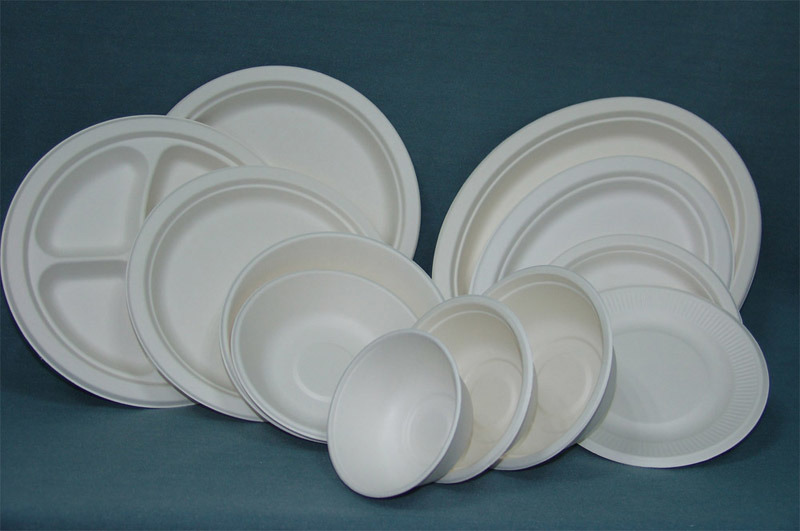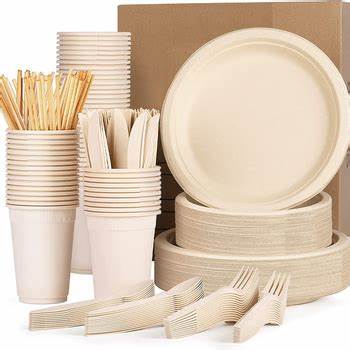Pulp molding, an innovative and sustainable manufacturing process, has gained significant attention in recent years for its role in producing eco-friendly tableware for catering. This method utilizes various types of pulp, often derived from recycled paper or agricultural waste, to create a wide range of disposable and biodegradable products. From plates and bowls to trays and utensils, pulp molding has emerged as a viable and environmentally responsible alternative to traditional plastic and foam-based catering supplies.

Understanding Pulp Molding
The Basics of Pulp Molding
Pulp molding, also known as pulp molding tableware machine, involves the use of a mold to shape and form paper pulp into a desired product. The process typically begins with the collection of raw materials, which can include recycled newspapers, cardboard, or agricultural waste such as sugarcane bagasse. These materials are broken down into a pulp, mixed with water, and then formed into the desired shape using molds.
The Molding Process
The molding process is relatively simple yet highly effective. After the pulp is prepared, it is poured or injected into molds that define the shape and size of the final product. The molds can vary in complexity, allowing for the production of a wide range of tableware items with intricate designs and details. Once the pulp is in the mold, excess water is drained or pressed out, and the remaining pulp is left to dry and harden. The result is a sturdy and durable piece of tableware ready for use.
Advantages of Pulp Molding for Catering
Environmental Sustainability
One of the primary advantages of pulp molding for catering lies in its environmental sustainability. With increased awareness of the detrimental effects of plastic pollution on the planet, there is a growing demand for eco-friendly alternatives. Pulp molding addresses this concern by utilizing recycled materials and agricultural waste, reducing the environmental impact associated with traditional catering supplies.
Biodegradability
Unlike conventional plastic and foam-based tableware, pulp molding products are fully biodegradable. When disposed of, these items break down naturally, returning to the environment without leaving behind harmful microplastics. This characteristic aligns with the principles of a circular economy, where materials are reused, recycled, and reintegrated into the ecosystem.
Versatility in Design
Pulp molding allows for a high degree of versatility in design, making it suitable for a variety of catering needs. From elegant plates for formal events to sturdy trays for casual gatherings, the flexibility of this manufacturing process enables the creation of diverse tableware options. The molds can be customized to produce products that meet specific aesthetic and functional requirements, enhancing the appeal of pulp-molded catering supplies.
Cost-Effectiveness
The cost-effectiveness of pulp molding is another compelling factor for its adoption in the catering industry. Raw materials such as recycled paper and agricultural waste are often more affordable than traditional plastics. Additionally, the production process is energy-efficient, contributing to overall cost savings. As sustainability becomes a priority for businesses, the economic benefits of pulp molding further incentivize its use in catering operations.
Pulp Molding Applications in Catering
Plates and Bowls
Pulp molding is widely employed in the production of disposable plates and bowls for catering. These items can range from small dessert plates to larger dinner plates, offering a suitable option for various dining occasions. The strength and durability of pulp-molded plates make them a practical choice for serving a wide array of dishes.
Trays and Platters
Catering often involves the presentation and serving of multiple dishes simultaneously. Pulp moulding machinery facilitates the production of trays and platters that are not only functional but also visually appealing. These items can be designed to accommodate different serving needs, from cocktail parties to buffet-style events.
Utensils and Cutlery
Disposable utensils and cutlery are essential in catering scenarios where convenience is a key consideration. Pulp molding enables the creation of spoons, forks, knives, and other utensils that are both lightweight and durable. These items provide a sustainable alternative to traditional plastic utensils commonly used in catering.
Drinkware
In addition to solid tableware, pulp molding can be applied to the production of drinkware such as cups and coffee sleeves. The insulating properties of molded pulp make it suitable for hot and cold beverages alike. Whether hosting a formal dinner or a casual gathering, pulp-molded drinkware offers a sustainable and practical solution.
Challenges and Considerations
Moisture Resistance
While pulp molding offers numerous benefits, one challenge is the inherent moisture sensitivity of paper-based products. Catering often involves the serving of moist or liquid-based dishes, posing a potential issue for traditional pulp-molded items. However, advancements in coating technologies are addressing this concern by enhancing the moisture resistance of molded pulp products.
Market Perception
Changing consumer perceptions and preferences can impact the adoption of pulp-molded tableware in the catering industry. Educating consumers about the environmental benefits and positive attributes of these products is crucial for overcoming any initial resistance. Marketing efforts should highlight the sustainability, versatility, and cost-effectiveness of pulp molding as a viable choice for catering supplies.

Future Trends and Innovations
Advanced Coating Technologies
To address moisture resistance challenges, ongoing research focuses on developing advanced coating technologies for pulp-molded products. These coatings enhance the water-resistant properties of the tableware, expanding its potential applications in catering settings.
Customization and Branding
As the demand for unique and personalized catering experiences grows, customization and branding opportunities become increasingly important. Pulp molding allows for intricate designs and customization options, enabling catering businesses to align their tableware with their brand identity and event themes.
Integration of New Pulp Sources
Innovations in raw material sourcing are likely to play a significant role in the future of pulp molding. Researchers are exploring alternative pulp sources that can further reduce the environmental footprint of catering supplies. These sources may include agricultural residues, algae, and other sustainable materials. Besides, this pulp egg tray making machine can be used for making different trays.
Conclusion
Pulp molding represents a sustainable and forward-thinking solution for catering businesses seeking eco-friendly alternatives to traditional tableware. Its environmental benefits, versatility in design, and cost-effectiveness make it an attractive choice for a range of catering applications. As technology advances and consumer preferences evolve, pulp molding is poised to play an increasingly prominent role in shaping the future of catering supplies, offering a greener and more responsible approach to disposable tableware.